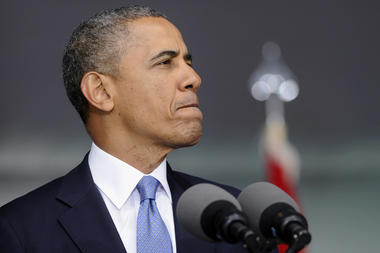President Obama’s measured defense of his foreign policy at West Point on Wednesday made many cogent points to rebut critics. Unfortunately, the speech also showed that he hasn’t digested some of the crucial lessons of his presidency.
Obama wisely said he wants “to see the world as it is, with all its danger and uncertainty.” And he repeated several interventionist applause lines, from touting America as the “indispensable nation” to affirming “American exceptionalism.”
But Obama ignored the “follow-through” part of U.S. power: Surely he can see that al-Qaeda regained control of Fallujah this year in part because America walked away from Iraq in 2010. Surely the president recognizes that terrorism has a deadly new face in Syria in part because he turned down a mid-2012 recommendation to train moderate opposition forces to counter the extremists. And surely he understands that Afghanistan could become a haven once more for al-Qaeda.
Yet Obama still wants to time-limit America’s commitment to security and stability. This assessment may sound harsh, but why else did he declare, as he did Tuesday, that U.S. forces in Afghanistan would fall to zero at the end of 2016, regardless of the situation there? That’s essentially the same mistake he made in 2009, when he said his “surge” of 30,000 troops in Afghanistan would begin coming home in 18 months, regardless.
I applaud Obama for trying to craft a foreign policy for the next decade that avoids the mistakes of the past decade. “We must not create more enemies than we take off the battlefield,” Obama told the long gray line of graduating cadets, who will pay the price for policy mistakes. But I wish he hadn’t needlessly announced to our enemies in Afghanistan how long they have to wait us out. Some of those young cadets must picture in their minds the grim prospect of flying back into Afghanistan, post-2016, to combat a future disaster.
Obama articulated the right structure for U.S. foreign policy going forward. He stressed the need for partnerships and multilateral action, except in those extreme cases where U.S. interests are directly at stake. He urged openness and transparency in counterterrorism policy, where, as the NSA scandals have shown, America needs to do some remedial work.
Obama’s signature idea was to create a Counterterrorism Partnerships Fund to provide up to $5 billion in security assistance to countries menaced by a morphing al-Qaeda. It’s an excellent proposal, not least because it builds on one of the best responses by President George W. Bush’s CIA to Sept. 11, 2001. The Bush administration deservedly gets blamed for the CIA’s torture of suspected terrorists, but people often overlook the big intelligence gains that came from helping friendly services build counterterrorism capabilities that could go places (and recruit sources) the U.S. couldn’t. Obama is smart to formalize this approach.
The maiden test of this fund will be in combating the spiraling growth of al-Qaeda in Syria and Iraq (and its even more extreme cousin, which calls itself the “Islamic State” in those two countries). Obama signaled that he will offer counterterrorism help to friendly governments in Jordan and Turkey, and to the not-so-friendly, Iranian-backed government in Iraq. The most creative idea Obama is considering is training entire units of the Syrian opposition so that they could operate as teams to stabilize liberated areas in northern and southern Syria. That’s worth doing.
For all Obama’s deliberation about increasing aid for the moderate Syrian opposition, it’s telling that the White House still hasn’t disclosed whether its assistance will be in the form of an overt, “Title 10” military training program, led by U.S. Special Operations forces, or remain a covert CIA paramilitary effort. Obama is said to have decided for the open military approach, which would probably include training entire units, but he doesn’t want to scare off key Arab partners, such as Jordan, which are nervous about so visible a program.
Obama was at his best explaining why his policy to contain Russian aggression in Ukraine was correct. Recognizing that America didn’t have military options to stop President Vladimir Putin, Obama used partners, alliances and sanctions. “Our ability to shape world opinion helped isolate Russia right away,” he said, describing the path to Sunday’s successful election, which Putin had wanted to torpedo. It was almost a declaration of victory.
If Obama can craft his partnerships to contain al-Qaeda, he will have created an important legacy. Administration officials privately suggest Obama would revisit the question of residual counterterrorism forces in Afghanistan in 2016 if the al-Qaeda threat there returns. I hope so.
Washington Post


Leave a Reply
You must be logged in to post a comment.